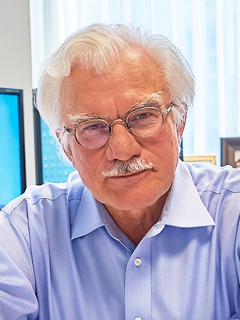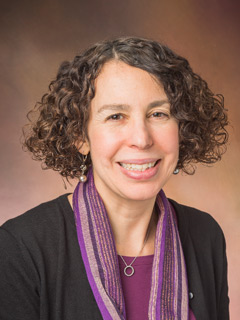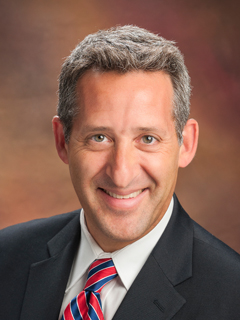HOW CAN WE HELP YOU? Call 1-800-TRY-CHOP
In This Section
Rose Payne Award, Research Mentor, RAI and Thyroid Cancer

The last research news roundup of the year is here – 2022 flew by in the blink of an eye! As you enjoy the holiday season, stay up to date on our research headlines. We feature new awards for immunogenetics work and mentorship and share new findings on treatment approaches for low-risk pediatric thyroid cancer.
Dimitrios Monos, PhD, Honored for Immunogenetics Work
The American Society for Histocompatibility and Immunogenetics (ASHI) honored Dimitrios Monos, PhD, director of the Immunogenetics Laboratory at Children’s Hospital of Philadelphia and an internationally recognized expert on histocompatibility (HLA) molecules, with the 2022 Rose Payne Award. The Rose Payne Award was established in 1984 to honor the American molecular biologist Rose Payne’s long-standing contributions to the field of immunogenetics and her support in the development of the society, according to ASHI’s website. ASHI is a nonprofit association of clinical and research professionals including immunologists, geneticists, molecular biologists, transplant physicians and surgeons, pathologists, and technologists.

Dimitrios Monos, PhD
Dr. Monos’ research covers a wide range of HLA-related issues pertaining to both the molecular aspects of HLA and the genetics of the major histocompatibility complex. His work has significantly advanced scientists’ understanding of HLA in different ways. Dr. Monos identified associations of HLAs with several diseases including Type 1 diabetes, pemphigus vulgaris, tuberculoid leprosy, berylliosis, sarcoidosis, Guillain Barre Syndrome, ovarian carcinoma, and Crohn’s disease. Collaborating with other labs, Dr. Monos’s lab pioneered the DNA-based methodologies for HLA typing. He also has worked on a number of structure/function relationships of HLAs, which are significant to the immune response.

Karen Puopolo, MD, PhD
Karen Puopolo, MD, PhD, Recognized for Mentorship
Congratulations to Karen, Puopolo, MD, PhD, attending physician in the Division of Neonatology, for being named 2023 Mentor of the Year by the Eastern Society for Pediatric Research (ESPR). The award recognizes an outstanding teacher who has made a “major impact on developing research skills in trainees and launching productive research careers.” Every year, the ESPR council accepts nominations and votes to recognize an individual for their contributions as an exceptional mentor for young faculty and investigators. Dr. Puopolo will accept the award at ESPR’s Scientific Meeting March 10-12, 2023, in Philadelphia.
Alongside her research, which focuses on neonatal sepsis epidemiology and risk assessment, Dr. Puopolo has devoted energy, time, and passion to inspiring the next generation of neonatologists by working with fellows and young faculty.
Dr. Puopolo has spoken proudly of her mentees and the work they have done in her research group to advance the field. Earlier this year, she received the prestigious American Academy of Pediatrics’ Pennsylvania Pediatrician of the Year Award. When asked what advice she would give to early-career researchers and pediatricians, Dr. Puopolo offered these words of wisdom: “Medicine is hard … So make sure you love it! There is a lot to love about it. I would never make a different choice. But choose your specialty wisely and your colleagues wisely. If you are doing what you love, the time flies by.”

Andrew Bauer, MD
Children with Low-Risk Thyroid Cancer Can Skip Radioactive Iodine
The standard treatment for children with differentiated thyroid cancer (DTC) has historically been a thyroidectomy followed by radioactive iodine (RAI), a type of internal radiotherapy. However, due to concerns for acute and long-term toxicity from RAI, in 2015 the American Thyroid Association published pediatric guidelines recommending that children should not get radiotherapy when their cancer is mostly confined to the thyroid. Now, a retrospective cohort study from CHOP researchers provides the first evidence to support that guideline. Previously, the approach of withholding RAI was validated in adults with low-risk DTC. The researchers presented the findings at the American Thyroid Association 2022 Annual Meeting in Montreal.
The study team found that in a cohort of patients under the age of 19 with low-risk DTC who had undergone a total thyroidectomy at CHOP between 2010 and 2020, those who did not receive RAI therapy showed no decrease in the rate of remission compared with those who received it. Andrew J. Bauer, MD, director of the Pediatric Thyroid Center at CHOP and senior author of the study, stated in a press release that the findings also showed that one year post-thyroidectomy is an early but accurate time point for initial assessment of remission in low-risk patients.
“This is the first study to validate those guidelines,” said Mya Bojarsky, the study’s first author and a 2022 student scholar in the CHOP Research Institute Summer Scholars Program. “Withholding RAI therapy is clinically beneficial, as it reduces exposure to radiation while having no negative impact on remission.”
ICYMI
Catch up on our headlines from our Dec. 9 In the News:
- Chris Feudtner, MD, PhD, MPH, Receives Norman J. Siegel Outstanding Science Award Two CHOP Investigators Named to Clarivate's Highly Cited Researchers List Next Generation Scientists Selected as 2022 STAT Wunderkinds Critical Step for Earlier Detection of Cancer in Children With Birth Defects Acute Myeloid Leukemia Ages Immune Cells, Impairs Treatment Response
Keep up with our news, stories, and updates in real time by following us on Twitter, LinkedIn, or Instagram. Or subscribe to our newsletter to get an email sent every other Friday by signing up here.


